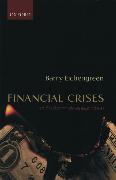Financial Crises
BücherAngebote / Angebote:
In this book, a leading observer of the international financial system assesses official efforts to address the problem of financial crises in emerging markets. Professor Eichengreen describes the progress that has been made in limiting the frequency of crises and strengthening theinternational financial system. He also shows that initiatives in this area have unintentionally made life more difficult for the poorest countries. He therefore argues that efforts to limit the threat to the international financial system need to be linked to an increase in developmentassistance. Another place where official efforts have fallen short, the author argues is in creating new ways of resolving crises. He shows that official financing through the International Monetary Fund is part of the problem. The IMF's financial rescues allow investors to escape without losses, in turn encouraging them to lend without due regard to the risks. This only makes the international system more crises prone. That the IMF has repeatedly come under pressure to bail out crisis countries reflects the absence of other acceptable ways of resolving the financial difficulties ofemerging markets. Not lending threatens to expose the international financial system to a disorderly and disruptive crisis. At the same time, radical new alternatives like an international bankruptcy court or international lender of last resort would create more problems than they solved-even ifthere was the political appetite for such ambitious schemes, which there is not. The author concludes that the best way to enhance the efficiency and stability of international financial markets is by pushing for changes to the provisions ofloan agreements that will enhance the capacity ofcreditors and debtors to resolve financial problems on their own.
Folgt in ca. 10 Arbeitstagen




